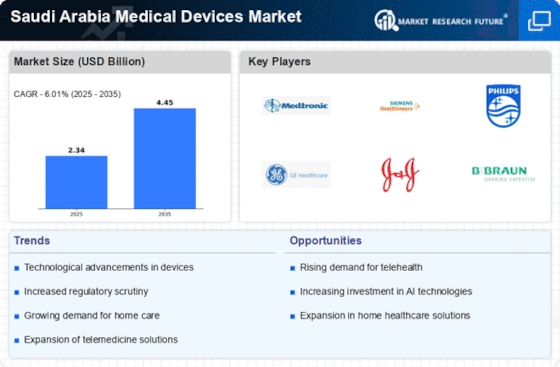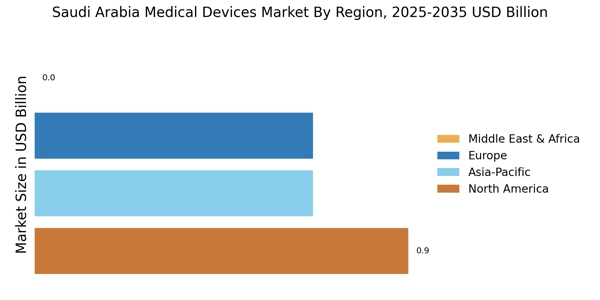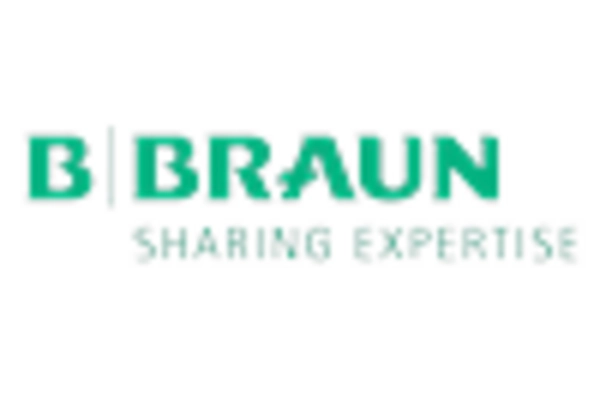Growing Healthcare Expenditure
The Saudi Arabia medical devices market is experiencing a notable increase in healthcare expenditure, driven by the government's commitment to enhancing healthcare services. In recent years, the healthcare budget has expanded significantly, with allocations reaching approximately 10% of the national budget. This financial commitment is likely to facilitate the procurement of advanced medical devices, thereby improving patient care and outcomes. Furthermore, the Vision 2030 initiative emphasizes the importance of healthcare as a key sector, which may lead to increased investments in medical technology. As a result, the Saudi Arabia medical devices market is poised for growth, with a focus on innovative solutions that address the evolving needs of the population.
Aging Population and Chronic Diseases
The demographic shift towards an aging population in Saudi Arabia is a critical driver for the Saudi Arabia medical devices market. As the population ages, the prevalence of chronic diseases such as diabetes and cardiovascular conditions is expected to rise. Reports indicate that by 2030, the number of individuals aged 60 and above will constitute a significant portion of the population. This demographic trend necessitates the adoption of advanced medical devices for effective disease management and monitoring. Consequently, the Saudi Arabia medical devices market is likely to witness increased demand for diagnostic equipment, monitoring devices, and therapeutic solutions tailored to the needs of older adults.
Regulatory Support and Standardization
The Saudi Arabia medical devices market is experiencing a favorable regulatory environment that supports the growth and standardization of medical devices. The Saudi Food and Drug Authority (SFDA) has implemented streamlined processes for the approval and registration of medical devices, which may encourage manufacturers to enter the market. Additionally, the establishment of regulatory frameworks that align with international standards is likely to enhance the quality and safety of medical devices available in the market. This regulatory support could foster innovation and competition among manufacturers, ultimately benefiting healthcare providers and patients alike. As a result, the Saudi Arabia medical devices market is expected to thrive in this conducive regulatory landscape.
Investment in Healthcare Infrastructure
The Saudi Arabia medical devices market is benefiting from substantial investments in healthcare infrastructure, which are essential for the effective deployment of medical technologies. The government has embarked on numerous projects to enhance healthcare facilities, including the construction of new hospitals and clinics equipped with state-of-the-art medical devices. These infrastructure developments are likely to create a conducive environment for the adoption of advanced medical technologies. Moreover, the establishment of specialized healthcare centers is expected to drive demand for specific medical devices tailored to various medical fields. Consequently, the Saudi Arabia medical devices market is positioned for growth as infrastructure improvements facilitate the integration of innovative medical solutions.
Increased Focus on Preventive Healthcare
The Saudi Arabia medical devices market is witnessing a paradigm shift towards preventive healthcare, driven by a growing awareness of health and wellness among the population. The government has initiated various campaigns aimed at promoting healthy lifestyles and early disease detection. This focus on prevention is likely to spur demand for medical devices that facilitate regular health monitoring and screening. For instance, wearable health technology and home diagnostic kits are gaining traction as consumers seek proactive health management solutions. As a result, the Saudi Arabia medical devices market is expected to expand, with an emphasis on innovative products that empower individuals to take charge of their health.


















